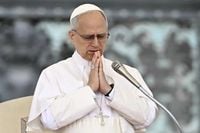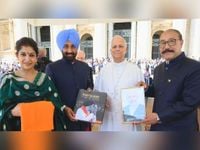Pope Leo XIV, the newly elected American pontiff, has found himself thrust into the heart of a contentious debate that has long divided the U.S. Catholic Church. After four months of relative quiet and careful diplomacy, Leo’s recent intervention in an abortion dispute surrounding Illinois Senator Dick Durbin has reignited fierce arguments over what it truly means to be “pro-life” and how the Church should navigate the treacherous waters of American partisan politics.
The controversy began with plans by Chicago Cardinal Blase Cupich to bestow a lifetime achievement award on Senator Durbin, a Democrat retiring at the end of his term, in recognition of his decades-long advocacy for immigrant rights. This gesture, however, drew immediate backlash from about a dozen conservative bishops and Catholic figures who objected to Durbin’s public support for abortion access. As reported by AP and Slate, the dispute quickly became headline news in Catholic circles, prompting the Vatican to weigh in.
On Tuesday, October 1, 2025, Pope Leo XIV addressed the issue during a press conference. Speaking in Italian but taking one question in English from a U.S. Catholic broadcaster, Leo struck a measured tone, urging mutual respect and a holistic view of a public servant’s record. He said, "I think that it’s very important to look at the overall work that a senator has done during, if I’m not mistaken, 40 years of service in the United States Senate. … It’s important to look at many issues that are related to what is the teaching of the church. Someone who says ‘I’m against abortion’ but says ‘I’m in favor of the death penalty’ is not really pro-life. Someone who says ‘I’m against abortion, but I’m in favor of the inhuman treatment of immigrants who are in the United States’—I don’t know if that’s pro-life."
Leo’s remarks, reported by AP and Slate, highlighted a tension that has simmered for years within the Church: the tendency among some to focus narrowly on abortion while overlooking other life-and-death issues such as the death penalty and the treatment of migrants. This broader definition of “pro-life” echoes the teachings of Pope Francis, Leo’s predecessor, who had sought to expand the church’s identity beyond Europe and into modern social concerns.
The reaction from conservative Catholic leaders and right-wing commentators was swift and severe. According to Slate, one former bishop called Leo’s comments "undermining the very foundation of the Gospel of Life," while Catholic pundit Matt Walsh decried them as "truly horrendous on about five different levels." Non-Catholic voices joined in as well, with evangelical influencer Allie Beth Stuckey labeling the pope’s logic "awful, left-wing." The backlash underscored the deep divisions within the American Catholic Church, where the culture wars over abortion, same-sex marriage, and immigration have often overshadowed the Church’s global mission.
Senator Durbin, for his part, has long been a lightning rod in these debates. Since 2004, he has been barred from receiving Holy Communion in his home diocese of Springfield, a prohibition enforced by Bishop Thomas J. Paprocki due to Durbin’s stance on abortion rights. Paprocki, a prominent conservative, has also called for denying Communion and funeral rites to those in same-sex unions and has rallied his allies in protest against honoring Durbin.
The dispute over the award was not merely symbolic. It tapped into a long-standing debate over whether Catholic politicians who support abortion rights should be denied Communion or otherwise sanctioned. As AP notes, figures like John Kerry, Nancy Pelosi, and President Joe Biden have all faced similar threats from individual bishops. Pope Francis, and now Leo XIV, have resisted such moves, arguing that Communion should be seen as spiritual nourishment for all, not a reward for ideological purity.
Cardinal Cupich, a close adviser to Francis and a defender of a more inclusive approach, lamented the polarization in his statement after Durbin declined the award. Cupich wrote, "It could be an invitation to Catholics who tirelessly promote the dignity of the unborn, the elderly, and the sick to extend the circle of protection to immigrants facing in this present moment an existential threat to their lives and the lives of their families." He also noted the tragic reality that "there are essentially no Catholic public officials who consistently pursue the essential elements of Catholic social teaching because our party system will not permit them to do so."
The White House, too, entered the fray. As reported by ABS-CBN and AP, Press Secretary Karoline Leavitt rejected Pope Leo’s implication that the U.S. government was guilty of "inhuman treatment" of immigrants. "The administration enforces immigration laws in the most humane way possible," Leavitt insisted, denying any systemic mistreatment of illegal immigrants. The exchange highlighted how the pope’s words, though directed primarily at Catholic leaders, reverberated through the broader American political landscape.
In the aftermath of Leo’s comments, Senator Durbin announced he would decline the lifetime achievement award. Bishop Paprocki, who had led the opposition, thanked Durbin for this decision and called on Catholics to "pray for our church, our country, and for the human dignity of all people to be respected in all stages of life including the unborn and immigrants." Cupich, meanwhile, expressed concern that Catholics might come to believe they could never work alongside Democratic politicians, a prospect he described as deeply troubling for the Church’s social mission.
The incident has exposed just how entrenched the partisan divide has become within the U.S. Catholic Church. Polls consistently show that American Catholics are split along party lines on key issues, mirroring the broader electorate. The Church’s leadership, particularly among the bishops, has grown more conservative in recent decades, often prioritizing abortion above all other social concerns. Yet, as Leo’s intervention makes clear, the Vatican’s view remains more nuanced, insisting on a consistent ethic of life that encompasses a range of issues from the unborn to the marginalized and the condemned.
In his closing remarks, Pope Leo XIV called for "greater respect for one another" and a collective search for ethical clarity. "We need to really look closely at all of these ethical issues and to find the way forward as a church. Church teaching on each one of those issues is very clear," he said. The pope’s comments—delivered with a mix of humility, humor, and resolve—signal that he is paying close attention to U.S. Catholic politics and is determined to steer a course that resists easy partisan categorization.
For now, the dust has settled with Durbin’s withdrawal and the bishops’ statements, but the underlying questions remain. As the first American pope, Leo XIV’s approach to these challenges will be watched closely—not just by Catholics, but by a nation grappling with its own divisions over faith, politics, and the meaning of life itself.


